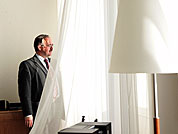Papers look to political future without Schmid

Switzerland's newspapers have commended Defence Minister Samuel Schmid for tendering his resignation and say the move marks the beginning of a new political season.
Schmid announced on Wednesday he would be stepping down at the end of the year, vigorously defending his record as head of the army and bemoaning the state of the country’s political climate.
Citing his health, his family and the good of both the country and the military, the former parliamentarian and army officer began drawing a close to an eight-year career in government.
“Cabinet Minister Schmid drew the appropriate conclusions from his weakened health, weakened ability to assert power and weakened motivation,” wrote a commentator in Zurich’s Neue Zürcher Zeitung (NZZ) newspaper.
“It came at the right time and it deserves respect.”
The German-language Tages-Anzeiger said Schmid would be remembered fondly “not because of his ups and downs as defence minister but because he cared”.
Schmid possessed a unique duality: some perceived him as boring and quiet, others as having charisma and wit.
“Schmid is probably everything simultaneously on account of his subdued manner,” the newspaper wrote, noting the minister’s reputation as cabinet’s everyman.
He would be remembered for his home with its small, unheated swimming pool, the Audi that he often drove himself and the local restaurants that he mostly favoured over more expensive establishments.
“Oomph”
But as was typical among Swiss, the Tages-Anzeiger wrote, Schmid lacked the “oomph” to really inspire people. Stoic and sometimes shy, his political instincts would wake in periods of crisis.
Trouble for the 61-year-old Bernese minister began this summer after the resignation of the army’s two top men and questions over his own judgement. Schmid defended his turf.
The Basler Zeitung felt the scandals were not sufficient grounds to force Schmid out of office but added that the pressure had been immense. Despite expectations from some that he could one way or another hang in, the affable minister on Wednesday made clear he had had enough.
“The cabinet minister resigned just when we thought he would miraculously go again for a second presidency in 2010,” wrote the Tribune de Genève.
Bern’s Der Bund newspaper called Schmid’s departure “the bitter end” and the Tages-Anzeiger called him “average” but the consensus was that the defence minister can leave office without shame: he will make his exit in December, not as a star but as a decent man.
“Samuel Schmid left the field with a final pirouette,” the Tribune de Genève wrote.
Political future
No sooner had Schmid declared his departure from politics, than speculation over his replacement and debate over a shifting political dynamic in Switzerland began.
Elected to cabinet in 2000 as a representative of the burgeoning rightwing Swiss People’s Party, in which Schmid was a moderate, he gained political support from outside his own party, the Tribune de Genève wrote.
“At the time, Schmid served as a shield against the onslaught of the isolationist right,” the paper’s editorialists wrote.
“Samuel Schmid was the antithesis of the dominant figure at the time,” the Blick tabloid said in reference to People’s Party figurehead Christoph Blocher, but noted that Schmid had been elected not by his friends but by his political enemies.
It had been a recurring problem throughout his entire career in cabinet.
“His friends were not friendly, his opponents not friends and the department he was dealt was not sexy. Samuel Schmid could not win. And he did not,” the tabloid wrote.
The Tages-Anzeiger said: “Schmid’s resignation offers a chance to fix the procedural situation in the cabinet and to again incorporate the Swiss People’s Party into the government.”
“The cards will now be re-dealt,” wrote the NZZ. Although the leftwing Green Party has signalled an interest in a cabinet position, the newspaper said the return of the People’s Party was a “foregone conclusion” and that there could be another vacancy in the cabinet.
People’s party approach
Most papers debated how the People’s Party would approach the new political landscape – and had some advice.
“The People’s Party will have to prove its good intentions for government,” wrote the Tribune de Genève. “If the right wants to return to government, it should provide guarantees and quit the logic of opposition.”
The NZZ said the party would be back “with all their strength”; but it wondered whether one of the more divisive figures to grace the Switzerland’s national political scene would return.
“The critical question will be whether the People’s Party will again compete with Christoph Blocher,” was the view of one analysis piece. But another in the same paper said that while cabinet needed to reflect the country’s political spectrum, Blocher’s time had clearly passed.
“There are better and more viable candidates from the People’s Party. Christoph Blocher is no more,” it said.
Replacements from the People’s Party have already been floated but the Blick says no charismatic figure – “no Obama” – is in sight to return the party to its former glory.
“Now Schmid is the only one who can smile in satisfaction,” it commented.
swissinfo, Justin Häne
Born in 1947, Schmid is married and has three children.
After law studies at Bern University, he practised as a lawyer.
He began a political career in his commune of Rüti bei Büren and was later a member of the Bernese cantonal parliament (1982-1993)
He was a member of the Swiss House of Representatives from 1994 to 1999 before becoming a member of the Senate (1999-2000). He was also head of the People’s Party parliamentary group (1998-1999).
Elected to the government on December 6, 2000, he took office the following January. He was president of Switzerland in 2005.
In announcing his resignation from politics on Wednesday, Samuel Schmid hit out at his former political home, the Swiss People’s Party, criticising what he characterised as its divisiveness and ideological rigidity.
“Polemics and ungrounded polarisation do not belong in the political culture of this land,” Schmid said.
“Moderation and reason are the political foundations of our society,” he added and some in Switzerland’s press agreed.
“The political business has also grown harsher and colder in this country,” wrote the NZZ, adding that it gave the defence minister an excuse to step down.
The newspaper also made note of “personality politics and individual issues” that had hindered policymaking.
The Tribune de Genève said the People’s Party had to play better with other political parties and prove its “good intentions”.
An editorial in the Tages-Anzeiger said the nature of politics was indeed polarised “but nevertheless perfectly suited to Switzerland”.

In compliance with the JTI standards
More: SWI swissinfo.ch certified by the Journalism Trust Initiative




You can find an overview of ongoing debates with our journalists here. Please join us!
If you want to start a conversation about a topic raised in this article or want to report factual errors, email us at english@swissinfo.ch.